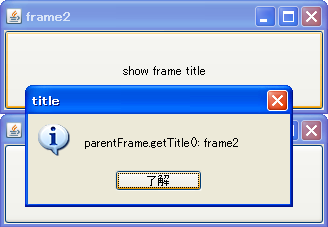Swing/WindowAncestor のバックアップの現在との差分(No.7)
TITLE:WindowAncestor(親ウィンドウ)の取得
WindowAncestor(親ウィンドウ)の取得
編集者:Terai Atsuhiro~
作成日:2005-05-09
更新日:2023-08-25 (金) 13:56:29
概要
SwingUtilities.getWindowAncestor()などで、親ウィンドウを取得します。
Screenshot

Advertisement
概要
SwingUtilities.getWindowAncestor()などで、親ウィンドウを取得します。#screenshot
サンプルコード
#spanend
#spandel
JButton button = new JButton(new AbstractAction("フレームのタイトルを表示") {
#spanend
public void actionPerformed(ActionEvent ae) {
final JButton btn = (JButton)ae.getSource();
final JFrame frame = (JFrame)SwingUtilities.getWindowAncestor(btn);
//final JFrame frame = (JFrame)JOptionPane.getFrameForComponent(btn);
EventQueue.invokeLater(new Runnable() {
public void run() {
JOptionPane.showMessageDialog(frame,
"親フレームのタイトル: "+frame.getTitle(),
"タイトル", JOptionPane.INFORMATION_MESSAGE);
}
});
#spanadd
* サンプルコード [#sourcecode]
#spanend
#spanadd
#code(link){{
#spanend
#spanadd
JButton button = new JButton("show frame title");
#spanend
#spanadd
button.addActionListener(e -> {
#spanend
// Container w = ((JComponent) e.getSource()).getTopLevelAncestor();
Window w = SwingUtilities.getWindowAncestor((Component) e.getSource());
// Frame frame = JOptionPane.getFrameForComponent((Component) e.getSource());
if (w instanceof Frame) {
Frame frame = (Frame) w;
String msg = "parentFrame.getTitle(): " + frame.getTitle();
JOptionPane.showMessageDialog(
frame, msg, "title", JOptionPane.INFORMATION_MESSAGE);
}
});
- &jnlp;
- &jar;
- &zip;
解説
解説
自分(コンポーネント)の最初の上位ウィンドウ(親ウィンドウ)を取得します。 SwingUtilities.getWindowAncestor、SwingUtilities.getRootメソッドを使うとjava.awt.Windowが、JOptionPane.getFrameForComponentメソッドを使うとjava.awt.Frameが返されます。- SwingUtilities.getWindowAncestor(Component c)
-
SwingUtilities.windowForComponent(Component c)は、このgetWindowAncestorをラップしただけのメソッド - 親の
java.awt.Windowが返る - 親
Windowが無い場合はnullが返る - 引数の
Component自体がWindowの場合そのWindowのオーナーWindowが返る- オーナー
Windowがnullの場合はnullが返る
- オーナー
-
- SwingUtilities.getRoot(Component c)
- 親の
Component(java.awt.Windowまたはjava.awt.Applet)が返る-
Windowの場合はc.getParent()で見つかる最初の上位Windowオブジェクトだが、Appletの場合はJComponent#getTopLevelAncestor()とは異なり最後の上位Appletオブジェクト
-
- どちらも存在しない場合は
null - 引数の
Component自体がWindowの場合はそのまま自身が返る
- 親の
- JComponent#getTopLevelAncestor()
- 自身の親
Container(java.awt.Windowまたはjava.awt.Applet)が返る - 親
Containerが無い場合はnull -
java.awt.Windowまたはjava.awt.Appletから呼ばれた場合はそのまま自身が返る - 下のコメント参照
- 自身の親
コメント
- JComponent#getTopLevelAncestor()でもほぼ同じ内容が取得できるような感じですね(自分自身からスタートするか、親からスタートするかの違いはあるようですが)。ただ、この場合、Windowの他にAppletが戻される場合もあるようですが。 -- syo?
- 補足ありがとうございます。WindowかAppletか気にする必要が無いのは便利そうですね。 -- terai
- JOptionPane.getFrameForComponent(Component parentComponent)
- 親の
java.awt.Frameが返る - 有効な親
Frameが無い場合はJOptionPane.getRootFrame()で非表示にしているTookKit Privateなフレームが返る -
JOptionPane用?
- 親の
